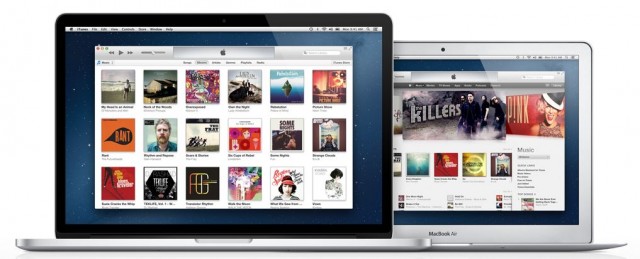Google, Facebook and even Yahoo have been hailed as visionary companies that aren’t just disrupting old media, they’re replacing it. That conjecture hasn’t applied as readily to Apple, which after all deals in high-end hardware, not eyeballs or advertising.
A closer look, however, reveals that Apple not only has a significant media business, it’s bigger than most major media companies — and possibly at their expense.
By itself, Apple’s iTunes (which was just updated) and App stores, which hawk everything from movies and music to books and newspaper subscriptions, make more money than The New York Times; Simon & Schuster, which publishes the best-selling “Steve Jobs” biography; Warner Bros. film studios, which owns the popular Batman film franchise; and Time Inc., the largest magazine publisher in the U.S.
Combined.
Apple’s media storefronts took in more than $8.5 billion for the fiscal year ending in September. Put together, the revenue of the above-mentioned media companies only adds up to $8.2 billion for the same period, about $300 million less than Apple.
To be sure, a fair amount of those sales include apps unrelated to entertainment or media. The company doesn’t break out those sales versus media or entertainment purchases, but the primary draw for consumers has long been iTunes’s ever-growing media library, which started with 99 cent song downloads and now includes $455 annual subscriptions to the New York Times.
The irony here is that the maker of the best-selling iPad and iPhone doesn’t make any content. Instead, it relies on the media industry’s willingness to sell their precious movies, TV shows, newspapers and books through Apple in an arrangement that’s allowed the iTunes and App stores to outpace the very companies supplying them.
Mobile Mania
The media companies, after a period of hesitation, realized they needed to make their products available on those must-have mobile devices that so dominate consumer culture today — despite whatever costs that may add to the future of their business.
CBS, for example, while the most-watched TV network in America, still makes less money than Apple’s media division. Marvel? Universal? 20th Century Fox? Disney’s film studios? All beat. The division is six and a half times larger than Paramount film studios. Newspaper and magazine publishers barely register compared to Apple’s media store on which they now partly rely for new circulation revenue.
Of course, Apple’s content business doesn’t compare to many of the vast holding companies that sit behind these studios and television businesses. News Corp., owner of Fox News and FX and led by Rupert Murdoch, generated $33.88 billion in sales during Apple’s fiscal year, while Disney, owner of ESPN and ABC, took in more than $42.28 billion, which includes its lucrative parks and resorts.
Apple’s media business, nonetheless, is growing faster than any of those entertainment behemoths, around 35 percent annually. At that rate, iTunes will be bigger than Viacom Inc., which owns Nickelodeon, MTV and Paramount, by 2014.
Tom Neumayr, a spokesman for Apple, declined to comment on Apple’s media business.
Apple’s Slice
The late Steve Jobs long espoused the need for Apple to make entertainment easier to use, find and buy. But that didn’t necessarily mean buying the content itself. Apple’s media income comes almost entirely from the 30 percent commission it receives from sales in its iTunes and App stores.
Charles Wolf, analyst with Needham & Co. in New York, estimates it’s a “modestly profitable business” for Apple since the primary cost to them is the credit card transaction fee. Apple takes about 30 cents for every 99-cent song downloaded, with credit card companies charging Apple around 25 cents for each transaction, according to Wolf. The explosion of higher-priced media, however, from $15 books and $20 movies to $500 annual newspaper subscriptions, has vastly increased Apple’s media margins.
Marvel’s “The Avengers” movie, owned by Disney, for example, is available on iTunes for $14.99. Apple stands to make around $4.25 on each download after paying the credit card transaction fee. That “Steve Jobs” biography published by Simon & Schuster? $16.99 in iTunes. Apple keeps $4.85.
But Apple’s real influence over media markets comes from the more than 435 million individual iTunes accounts stored in the company’s database, according to Talal Khan, analyst with Credit Suisse Group AG in New York.
“That’s what gives Apple the power to come into media companies and ask for terms,” he said.
It’s a state of play Google and others are trying to disrupt — with limited success — and that traditional media companies have largely accepted. In many ways, Apple has become our de facto entertainment repository; the endless trails of consumers who line up for Apple’s latest tablets only reinforce this view. After all, what are they going to do once they rip open the Cellophane and boot up their latest screens? Buy more media.
Via: Bloomberg













